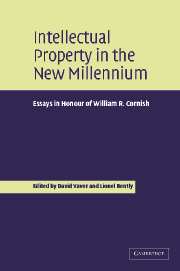Book contents
- Frontmatter
- Contents
- List of contributors
- Foreword
- Preface
- General intellectual property
- Patents and plant protection
- Trade marks and unfair competition
- Copyright, moral and neighbouring rights
- 15 The Berne Convention: the continued relevance of an ancient text
- 16 The (new?) right of making available to the public
- 17 Private copy licence and levy schemes: resolving the paradox of civilian and common law approaches
- 18 Paternalism and autonomy in copyright contracts
- 19 Criminality and copyright
- 20 Towards new forms of neighbouring rights within the European Union?
- William R. Cornish – curriculum vitae
- Index
19 - Criminality and copyright
Published online by Cambridge University Press: 25 May 2010
- Frontmatter
- Contents
- List of contributors
- Foreword
- Preface
- General intellectual property
- Patents and plant protection
- Trade marks and unfair competition
- Copyright, moral and neighbouring rights
- 15 The Berne Convention: the continued relevance of an ancient text
- 16 The (new?) right of making available to the public
- 17 Private copy licence and levy schemes: resolving the paradox of civilian and common law approaches
- 18 Paternalism and autonomy in copyright contracts
- 19 Criminality and copyright
- 20 Towards new forms of neighbouring rights within the European Union?
- William R. Cornish – curriculum vitae
- Index
Summary
Our honor and has never espoused conventional wisdom, especially not that promoted by those pressing for ever greater expansion of the law of intellectual property to protect the interests of the entertainment and information industries. It is thus fitting to examine the expansion, both in extent and severity, of the imposition of criminal sanctions as a means for its enforcement.
It is not so long since the highest courts3 rang with denunciation of any attempt to equate infringement of intellectual property rights with the crime of theft. Rank Film Ltd v. Video Information Centre was a unanimous decision of a very strong House of Lords, the main speech being delivered by Lord Wilberforce. The defendant resisted an Anton Piller order as breaching his privilege against self-incrimination by soliciting information and the supply of documents relating to alleged pirating of video tapes. Three crimes were advanced; infringement of copyright, criminal conspiracy to infringe, and criminal conspiracy to defraud. The claimants argued that any such privilege could be abridged by section 31 of the Theft Act 1968. Although Lord Wilberforce disregarded the first two crimes, on the interesting ground that they were moribund, he thought that the third was valid, and unaffected by section 31, because ‘Infringement of copyright is not theft’. This was crucial, and all the stronger since the House of Lords was reluctant to disallow the appeal, indeed Lord Russell pleaded for extension of section 31 to such cases.
- Type
- Chapter
- Information
- Intellectual Property in the New MillenniumEssays in Honour of William R. Cornish, pp. 266 - 279Publisher: Cambridge University PressPrint publication year: 2004

